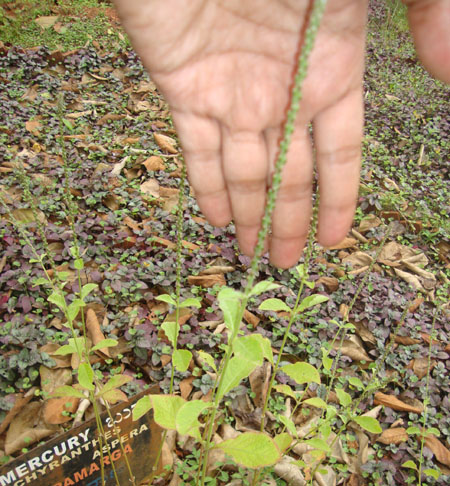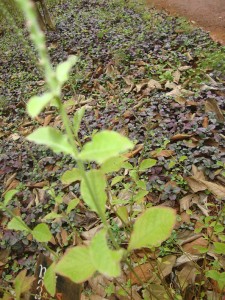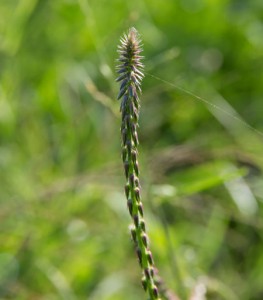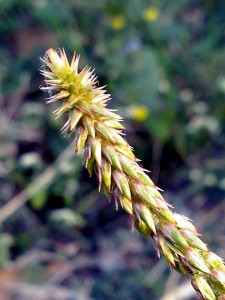Apamarga – Achyranthes aspera – Uses, Dose, Side Effects
Apamarga – Achyranthes aspera is one of the powerful Ayurvedic herbs. It is used to prepare a special medicine called Kshara, used extensively in surgical procedures to treat fistula, and as an oral medicine for obesity, tumors etc.
Botanical Name-Achyranthes aspera Linn.
Family- AMARANTHACEAE (Apamarga kula)
Table of Contents
Vernacular Names
English name – Prickly Chaff flower
Hindi Name-Chirachinta, Chirchira; Chingchingi, Chirchita, Latjira, Onga
Kannada name – Uttrani, Uttarani
Telugu Name- Antisha; Apamargamu; Uttaraene (ఉత్తరేణి)
Malayalam Name- Katalati, Kadaladi
Bengali Name- Apang
Punjabi Name- Puthakanda, Kutri
Marathi Name- Aghada, Pandhara-aghada
Malagasy Name – Mahabaka
Tamil Name – Shiru kadaladi, Nayuruvi
Sinhala – Karal heba
Indonesia : Jarong
Afrikaans – Grootklits, Langklitskafblom.
French name – herbe à Bengalis, herbe sergen, queue de rat.
Spanish name – Cadillo chichoborugo, cadillo de mazorca, mazotillo.
Sanskrit Synonyms
Markati,
Markata pippali,
Kapi Pippali – fruits bite, grab into cloths like monkey
Pratyak Shreni – flowers face downward
Mayuraka – It is anti poisonous / cures many diseases
Kinihi – named so because of spiked flowers
Shikhari – the flowers and fruits are stacked over one another to form the shape of a tomb.
Adhah shalya – Spinous bracteoles and pointed perianth
Khara Manjari – The fruits stick to the cloths, make the plant hard to grab and act as weapon in favor of the plant
Marga – Cleanses all the channels
Ksharamadya – Whole plant is predominantly alkaline
Kshavaka – Causes sneezing, the seeds possess Sirovirechana property
Kubja,
Vasheera,
Durabhi graha,
Durgraha – Plant is difficult to hold due to sharp fruits and spiky flowers
Classical categorisation
Charaka-
Shiro virechanopaga – Group of herbs used in expelling Doshas from head and neck, Through Nasya, Dhoomapana etc.
Krimighna – Group of herbs with anti microbial and anti parasitic action.
Vamanopaga- a group of herbs used in Vamana treatment.
Sushruta- Arkadi
Vagbhata- Arkadi

Identification
When you walk in any Indian farm, you may feel small fruits with sting getting stuck to your dress and your legs.

Varieties, distribution
Two varieties of Apamarga by DN, RN, Bha .Ni
Shweta – White – Achyranthes aspera
Rakta – red – Pupalia lappacea Moq.
Kai ni
1. Apamarga
2. Vasika
3. Ramatha (Toyapamarga)
Cyathula prostrata – is used as Kshudra Apamarga (cheriya kadaladi) in Kerala. It is used in treating wounds. Malays use this herb in decoction form to treat cough and cold. Its ash is mixed with water and applied externally to treat eczema.
Distributions– Common as weed throughout India and tropical region.
Habitat – The plant grows in waste places and tropical and temperate regions.
Morphology
Habit – Wild perennial herb
Root – Branched tap root
Stem – Aerial, erect, angular, branched, Hairy, Herbaceous, but woody below.
Leaf – Opposite, hairy, reticulate venation
Fruit – And indehiscent achene enclosed within persistent perianth

Medicinal properties
Achyranthes aspera – Medicinal properties
Rasa (taste) – Katu (pungent), Tikta (Bitter)
Guna (qualities) – Laghu (lightness), Rooksha (dryness), Teeksna (Strong, sharp) Sara (induces movement)
Vipaka- Katu – Undergoes pungent taste conversion after digestion
Veerya – Ushna (hot potency)
Effect on Tridosha – Balances Kapha and Vata Dosha.
Part used, dosage
Part used-root, seed, leaf, whole plant, Kshara
Dosage- fresh juice – 5 – 10 ml in divided dose per day.
Kshara 0.5-2 g – in divided dose per day.
Chemical constituents
Achyranthes aspera chemical constituents:
Betaine, Achyranthine, Hentriacontane, Ecdysterone; achyranthes saponins A,B,C,D.
(Reference: Illustrated Dravyaguna Vijnana, Vol. II, by Dr JLN Shastry)
Medicinal uses
Achyranthes aspera medicinal uses
Kaphanashana – Breaks down and expels sputum collection
Arshaghna – Useful in piles, hemorrhoid’s
Kandughna, Kanduhara – Useful in relieving pruritus (excessive itching)
Udaraghna – Useful in ascites
Pachana, Amaghna – Relieves ama – a product of indigestion and altered metabolism.
Raktagrahi – Improves blood
Hrut Grahi, Vantikrut, Vaamana – An excess dose may cause nausea and vomiting.
Deepana, Agnikrut – Improves digestion strength
By using this for Nasya, it helps to relieve worms and infections in head and neck region
Anilapaha – relieves bloating, balances Vata Dosha.
Shulahara – relieves abdominal colic pain.
Hidhmahara – relieves hiccups
Arshohara – useful in piles, hemorrhoid’s
Dadruhara – useful in urticaria, itching, allergic skin rashes
Apachihara – useful in fibroids, glandular growths.
Rochana – improves taste, relieves anorexia
Hrudruja – useful in cardiac disorders with cholesterol deposition in blood vessels.
Adhmanahara – relieves bloating, gaseous distension of abdomen
Apamarga fruit is sweet in taste, hard to undergo digestion, useful in Raktapitta – bleeding disorders
The plant is an excellent diuretic. Hence useful in dysuria, urinary retention, water retention and urinary stones.
It helps to break down the kidney and bladder stones. This action is not only due to its diuretic action.
Pharmacological Action
Anti Hypertensive
Anti diabetic
Abortifacient
Diuretic
Purgative
Spasmolytic
Hypoglycemic
Anti fungal

Remedy for asrigdara (heavy menstrual bleeding):
अपामार्गदलंपिष्ट्वा तिलतैलेन पाययेत् ।
असृग्दरप्रशान्त्यर्थ रहस्यमिदमौषधम् ॥
(सहस्रयोग)
apāmārgadalaṃpiṣṭvā tilatailena pāyayet |
asṛgdarapraśāntyartha rahasyamidamauṣadham ||
(sahasrayoga)
Paste of Apamarga (Achyranthes aspera) leaf should be consumed along with sesame oil for the cure of asrigdara or excessive menstrual bleeding.
Method of intake: Apamarga (Achyranthes aspera) leaf paste should be prepared by rubbing it on stone plate by adding a liitle quantity of water and should be consumed in a dose of 3 to 5 grams two times a day, along with 3 to 5 ml of sesame oil, before food.
External application
Apamarga root paste is applied externally to relieve pain, in scorpion bites, in cases of urticaria, itching etc.
Apamarga kshara is used in making an oil – Apamarga kshara taila – used as ear drops for ear disorders.
For weight loss
Achyranthes aspera for weight loss
Chedi – has a scraping effect, useful in cholesterol deposition, fat reduction. Hence, Apamarga is one of the efficient herbs to induce weight loss.
Medohara – reduces fat deposition
Apamarga Kshara
The dry Achyranthes aspera plant is burnt in open air and ash is dissolved in water and processed to prepare a medicine, used in many minor surgical conditions and also for oral administration. Read full details of Apamarga Kshara
Use of Apamarg in making Bhasma of Tin and Zinc –
In preparing Vanga Bhasma (Calx of Tin) and Yashada Bhasma (Calx of Zinc), the powder of Apamarga and Ashwattha (Ficus religiosa) is added to the molten metal and ground. This process is called Avapa.
Research
Wound healing and anti oxidant activity
Antibacterial activity
Phytochemistry and morphology
Side effects
Apamarga side effects:
In high doses, it may cause vomiting.
It is not suitable for use in pregnant ladies. Can be used in lactating mothers and in children in lower doses for a limited period of time.
For men, undergoing infertility treatment, it is better to avoid long term usage of Apamarga.
Interaction with medicines, supplements
Can this be used while taking Homeopathic medicine?
Yes. This product does not react with homeopathic medicine.
Can this medicine be continued while taking supplements like multivitamin tablets, Omega 3 fatty acids etc?
Yes. Generally, this product goes well with most dietary supplements. However, if you are taking more than one product per day, please consult your doctor for an opinion.
With western
medicines
Seek your
doctor’s advice if you are taking this product along with other western
(allopathic / modern) medicines. Some Ayurvedic herbs can interact with modern
medicine.
If both Ayurvedic and allopathic medicines are advised together, then it is
best to take Allopathic medicine first, wait for 30 minutes and then take the
Ayurvedic medicine.
Ayurvedic medicines
Ayurvedic medicines with Achyranthes aspera:
Gorochanadi gulika – used in pneumonia, cough, cold, bronchitis, asthma, throat diseases.
Jyotishmati Oil – used in treating leucoderma
Apamarga Kshara for warts
Apamarga Kshara (alkali) is used locally for the treatment of warts. Often, it is mixed with Tankana Bhasma and lemon juice and applied. But this procedure can cause burns if tried without medical consultation. Hence, consulting a doctor is very necessary for this procedure.
Sthanika Karma (Systemic Action)
External – Analgesic, Anti inflammatory, scraping, Ant poisonous, wound cleansing action. It can be used as a Siro virechana medicine (Nasal installation to expel vitiated doshas from head and neck region). Anjana (Collyrium) with its root mixed with honey is indicated in eye disease called Avrana sukla. It has an Ant poisonous effect and external application of its paste is recommended in Scorpion bite. Oil prepared out of its Alkali is indicated in karnasoola(Earache). Root powder can be used for sprinkling in skin diseases.
Digestive System – Carminative, digestant, stimulates the release of bile from gallbladder, Ant helminthic. Indicated in Loss of appetite, Anorexia, Vomiting, Abdominal distension, Hemorrhoids, Gallbladder stone, Helminthiasis, Ascites etc.
Circulatory System – Acts as a blood purifier, Indicated in Rheumatic heart diseases, Anemia, Cervical lymphadenopathy etc.
Respiratory system – Its Alkali can be used to eliminate kapha dosha.
Excretory system – Indicated in Urinary infection, Renal calculi etc. Increases urine production.
Skin – Indicated in itchy skin lesions.
Satmikarana – Ant poisonous, Indicated in general debility.











9 comments
Nishu pal
What is the synonym of apamarga
Dr J V Hebbar MD(Ayu)Author
Written in the article above.
Shankar Chakma
Other uses of Achyranthes rather than medicinal uses
Dr J V Hebbar MD(Ayu)Author
Not known to us. If you know, please enlighten us 🙂
Dr J V Hebbar MD(Ayu)Author
No.
Sai
Sir , plus tell us how do we use it for weight loss which part of the plant , what proportions , what time , internal or external and how long can we use it and preparation of such drug out of this plant . Please specify in detail.
Dr J V Hebbar MD(Ayu)Author
Apamarga capsule – 1 capsule 2 times a day after food for 2 months time is useful in obesity.
tulip
where can i get this from? and how to use apamarga leaves for curing tooth cavity?
Dr J V Hebbar MD(Ayu)Author
Its powder is available in amazon website here
https://amzn.to/35qqpz4
(affiliate link)